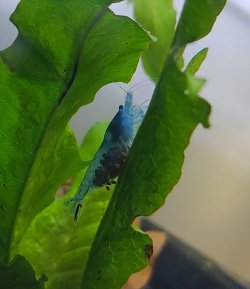Nells250
Fish Crazy
HI folks - I am new to shrimp and would like to know if they ever play dead??
This morning when I turned on the light for one of my plant-test-tanks, my one large blue shrimp was floating on its side on the surface of the water, motionless. I was disappointed because I always wanted a blue one, and would rather one of the low-quality culls die than that one.
So I took my trusty bamboo skewer to fish it out. And wadayaknow?? The thing darted away! It sure looked dead to me!
Then when I came home and took a peek to see how it was doing, every shrimp in there was darting around having a grand-old-time. For the last two days they all were barely active!
I obviously have a lot to learn about these little guys...

This morning when I turned on the light for one of my plant-test-tanks, my one large blue shrimp was floating on its side on the surface of the water, motionless. I was disappointed because I always wanted a blue one, and would rather one of the low-quality culls die than that one.
So I took my trusty bamboo skewer to fish it out. And wadayaknow?? The thing darted away! It sure looked dead to me!
Then when I came home and took a peek to see how it was doing, every shrimp in there was darting around having a grand-old-time. For the last two days they all were barely active!
I obviously have a lot to learn about these little guys...



